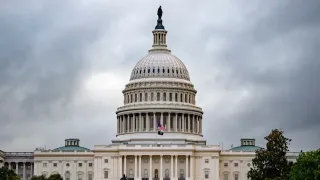
4 hours ago
Fenway Health Halts Gender-Affirming Hormone Care for Youth Under Federal Pressure
READ TIME: 3 MIN.
Fenway Health, founded in 1971, is one of the United States’ most prominent community health centers specializing in care for LGBTQ+ people, including comprehensive gender-affirming medical services. The center has long served as a model for affirming, inclusive care and has been vocal in its commitment to transgender health across all age groups. Fenway Health’s services include primary care, behavioral health, and specialized transgender health programs, making it a vital resource for the local and national LGBTQ+ community.
In a move that has sent shockwaves through the LGBTQ+ health community, Fenway Health announced it will stop providing hormone therapy and puberty blockers to transgender patients under age 19. This policy shift, effective immediately, means that new adolescent patients seeking gender-affirming medical interventions—including hormone treatments—will not be able to initiate care at Fenway, though those already receiving care may continue their treatment under current protocols.
Fenway Health officials stated that the change is a direct response to threats from the federal government to withdraw funding from clinics that provide gender-affirming care to minors. The clinic’s leadership cited “anti-trans policies” under the Trump administration as a key factor in their decision, stating that the administration’s actions have created an environment where continuing care for transgender youth could jeopardize critical funding streams necessary to maintain broader health services.
The announcement has generated confusion and concern among patients and advocates. While The Advocate reports that Fenway Health is restricting care, the organization’s own publicly available FAQs state, “Fenway is not rolling back, restricting, ending, or pausing gender affirming care for youth or adults. Our intent is to continue care uninterrupted no matter the changes, restrictions, challenges, or attacks levied by elected officials”. In a separate statement, Fenway Health emphasized its commitment to uninterrupted care and described contingency plans to offset potential funding losses, including expanding billable services and pursuing philanthropic support.
Despite these assurances, the report by The Advocate cites direct confirmation from clinic officials that the new policy is in effect and motivated by federal pressures. This apparent discrepancy has left many in the community seeking clarification, with advocacy organizations calling for transparency and urging Fenway Health to detail how existing patients will be supported and what resources will be available to those now denied access.
Fenway Health’s decision comes amid a rapidly changing legal and political landscape for transgender health care in the United States. Over the past several years, a wave of legislation has sought to restrict or ban gender-affirming care for minors in multiple states, with several laws currently being challenged in federal courts. The U.S. Supreme Court recently heard arguments in United States v. Skrmetti, a case concerning Tennessee’s ban on gender-affirming care for minors, the outcome of which is expected to set a national precedent on the constitutionality of such restrictions.
The federal government, under the Trump administration, has issued guidance and signaled intent to limit or withhold funding from health centers that provide gender-affirming care to minors, particularly those reliant on federal grants or Medicaid reimbursement. As a federally qualified health center, Fenway Health receives significant federal funding, making it particularly vulnerable to these policy shifts.
Transgender youth and their families have expressed fear and frustration in response to Fenway Health’s new policy, which they say cuts off a critical lifeline for those seeking medically necessary care. National organizations, such as the Human Rights Campaign and the National Center for Transgender Equality, have condemned the ongoing attacks on gender-affirming care, warning that such restrictions endanger the mental and physical health of transgender youth and undermine established medical consensus.
Major medical associations, including the American Academy of Pediatrics and the American Medical Association, support gender-affirming care as evidence-based and essential for the well-being of transgender youth. Advocates argue that restricting access does not prevent youth from being transgender but instead increases risks of depression, anxiety, and self-harm.
Fenway Health has pledged to continue advocating at the state and federal levels to protect access to gender-affirming care. Clinic leadership is working with policymakers and seeking alternative funding strategies to ensure services for all patients, including those affected by the new policy. The organization has stated its intent to “lead with our values and do all we can to ensure Fenway remains a refuge and resource for those who need us,” and has encouraged patients to stay informed as the situation evolves.
Meanwhile, community groups and legal advocates are mobilizing to challenge government actions that threaten transgender health care, emphasizing the need for continued vigilance and support for vulnerable populations. The outcome of ongoing legal challenges and policy debates will likely shape the future of transgender health care access both in Massachusetts and nationwide.






